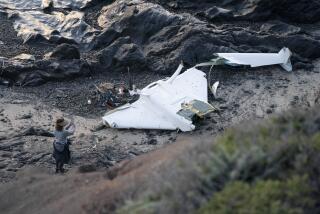Boeing to Stop Developing Older Unmanned Copter
- Share via
Boeing Co. said it would stop research and development on its Little Bird unmanned aircraft in favor of a newer program.
Little Bird, an update of a utility helicopter used in Vietnam, is an older technology that had largely been funded by Boeing. The company instead will focus on its new unmanned aircraft, the A160 Hummingbird, which has received more government funds, Boeing said this week.
“We have reached a point where we are waiting for government interest to further invest in this technology,” said Pat Donnelly, director of Boeing’s advanced rotorcraft systems. “We are going to focus our attention on the A160 moving forward.”
The market for unmanned aerial vehicles will expand by 50% to $1.5 billion by 2015, according to a study by Fairfax, Va.-based Teal Group Corp.
The Little Bird was 90% funded by Chicago-based Boeing, with help from the Army’s Aviation Applied Technology Directorate. The A160 was built by Frontier Aviation Inc. of San Diego, with funding from the Defense Advanced Research Projects Agency. The aircraft is being developed as part of the Army’s Future Combat Systems program.
The Little Bird doesn’t align with Boeing’s work on the Future Combat Systems, an effort worth about $160 billion to modernize the Army with a series of computer-networked manned and unmanned vehicles, said Richard Aboulafia, a Teal Group analyst.
The Future Combat Systems program “demands smaller systems to support the Army,” he said. “Little Bird is an unmanned version of a manned helicopter, bigger, more expensive and less stealth than the new A160.”
The A160 is a long-endurance aircraft with a performance goal of continued flight for more than 32 hours. The plane, which is manufactured in Irvine, uses less fuel than larger aircraft.
More to Read
Inside the business of entertainment
The Wide Shot brings you news, analysis and insights on everything from streaming wars to production — and what it all means for the future.
You may occasionally receive promotional content from the Los Angeles Times.










